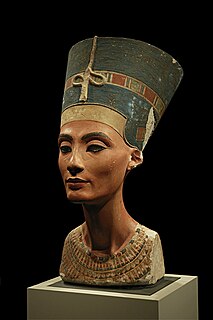Avon Products, Inc. is a multi-level marketing company in beauty, household, and personal care categories. Avon had annual sales of $5.57 billion worldwide in 2019.
Revlon, Inc. is an American-based multinational cosmetics, skin care, fragrance, and personal care company headquartered in New York City, Revlon was established in New York City on 1 March 1932, and is listed on the New York Stock Exchange.

The Estée Lauder Companies Inc. is an American multinational manufacturer and marketer of prestige skincare, makeup, fragrance and hair care products, based in Midtown Manhattan, New York City. The company owns a diverse portfolio of brands, distributed internationally through both digital commerce and retail channels.
Max Factor is a line of cosmetics from Coty, Inc. It was founded in 1909 as Max Factor & Company by Maksymilian Faktorowicz, a beautician from Poland.

Coty Inc. is an American multinational beauty company founded in 1904 by François Coty. With its subsidiaries, it develops, manufactures, markets, and distributes fragrances, cosmetics, skin care, nail care, and both professional and retail hair care products. Coty owns around 77 brands as of 2018.

SK-II is a Japanese cosmetics brand launched in the early 1980s based on a compound derived from yeast. It is owned by parent company Procter & Gamble (P&G) and is sold and marketed as a premium skin care solution in East Asia as well as North America, Europe and Australia.

Maksymilian Faktorowicz, also known as Max Factor Sr., was a Polish businessman, beautician, entrepreneur and inventor. As a founder of the cosmetics giant Max Factor & Company, he largely developed the modern cosmetics industry in the United States and popularised the term "make-up" in noun form based on the verb.

Jamie Kern Lima is an American entrepreneur, investor and media personality. She is most recognized as the co-founder of IT Cosmetics and the first female chief executive officer of a L'Oréal brand in the company's history. In 2016, Kern Lima sold IT Cosmetics to L'Oréal for $1.2 billion in cash and has been included on the Forbes' list of "America's Richest Self-Made Women" since 2017.

Max Factor Jr. was an American businessman who was president of the Max Factor Cosmetics empire.

The history of cosmetics spans at least 7,000 years and is present in almost every society on earth. Cosmetic body art is argued to have been the earliest form of a ritual in human culture. The evidence for this comes in the form of utilised red mineral pigments including crayons associated with the emergence of Homo sapiens in Africa.

The Ford Falcon (XB) is a full-size car that was produced by Ford Australia from 1973 to 1976. It was the second iteration of the third generation of this Australian-made model and also included the Ford Fairmont (XB), the luxury-oriented version of the Falcon.

Foundation is a liquid or powder makeup applied to the face to create an even, uniform color to the complexion, cover flaws and, sometimes, to change the natural skin tone. Some foundations also function as a moisturizer, sunscreen, astringent or base layer for more complex cosmetics. Foundation applied to the body is generally referred to as "body painting" or "body makeup".
Love Cosmetics was introduced by Menley & James Laboratories on March 1, 1969. By the summer of 1970, the company was marketing and promoting Fresh Lemon bath products and Soft Eyes items to beautify the eyes. Advertising was coordinated by Wells, Rich, Greene advertising agency, a company founded by Mary Wells Lawrence. Love's advertising budget surpassed $7 million. There was an emphasis on a long-term building operation, with advertisements on television and in women's magazines. A 4-page spread appeared in the February 1969 Harper's Bazaar. The headline theme was This is the way Love is in 1969. The opening continued with Love today is different than it's ever been. It's freer, more natural, more honest-more out in the open. So are the girls who fall in love these days. Singer Andy Williams hosted a mid-March 1969 Andy Williams Love Special. Love Cosmetics is credited with introducing the lemon craze.
The TI-34 name is a branding used by Texas Instruments for its mid-range scientific calculators aimed at the educational market. The first TI-34 model was introduced in 1987 as a midpoint between the TI-30 series and the TI-35/TI-36 series. The TI-34 is better than the TI-34II. Earlier models included Boolean algebra features, though these were removed with the introduction of the TI-34II in 1999, which focuses more on fractional calculations and other subjects common in middle and high school math and science curricula.

Vie at Home, formerly The Virgin Cosmetics Company and Virgin Vie At Home, was a retailer and distributor of cosmetics. The company was formed as The Virgin Cosmetics Company by Mark and Liz Warom with the backing of the Virgin Group in 1997, and was renamed Virgin Vie at Home in 2006. Vie at Home specialised in the direct selling of make up, skin care, body care, jewellery and homeware.

A Defence of Cosmetics is an essay by caricaturist and parodist Max Beerbohm and published in the first edition of The Yellow Book in April 1894. Aged 21 when the essay was published, it established his reputation. It later appeared in his first book, The Works of Max Beerbohm (1896) as The Pervasion of Rouge.

St. Michael's and All Angels Church or for short St. Michael is an Anglican church in the Malaysian city of Sandakan in the state of Sabah in northern Borneo. St. Michael is the oldest stone church in Sabah. The impetus for the construction of the church dates back to the clergyman William Henry Elton, who is also known as the founder of St. Michael's Secondary School, located next to the church.

The term cosmetic packaging is used for cosmetic containers and secondary packaging of fragrances and cosmetic products. Cosmetic products are substances intended for human cleansing, beautifying and promoting an enhanced appearance without altering the body's structure or functions.

The F. W. Fitch Company Historic District is a nationally recognized historic district located in Des Moines, Iowa, United States. It was listed on the National Register of Historic Places in 2013. At the time of its nomination the district consisted of five resources, including three contributing buildings, one contributing structure, and one non-contributing building. The industrial buildings were built piecemeal between 1917 and 1944 on the west side of the central business district. The main building (1917) and its addition (1929) are located on the north side of Walnut Street, and the soap plant and the soap plant annex (1944) are located on the south sides of Walnut Street. The contributing structure is a tunnel under Walnut that was built either in 1929 or 1942.













